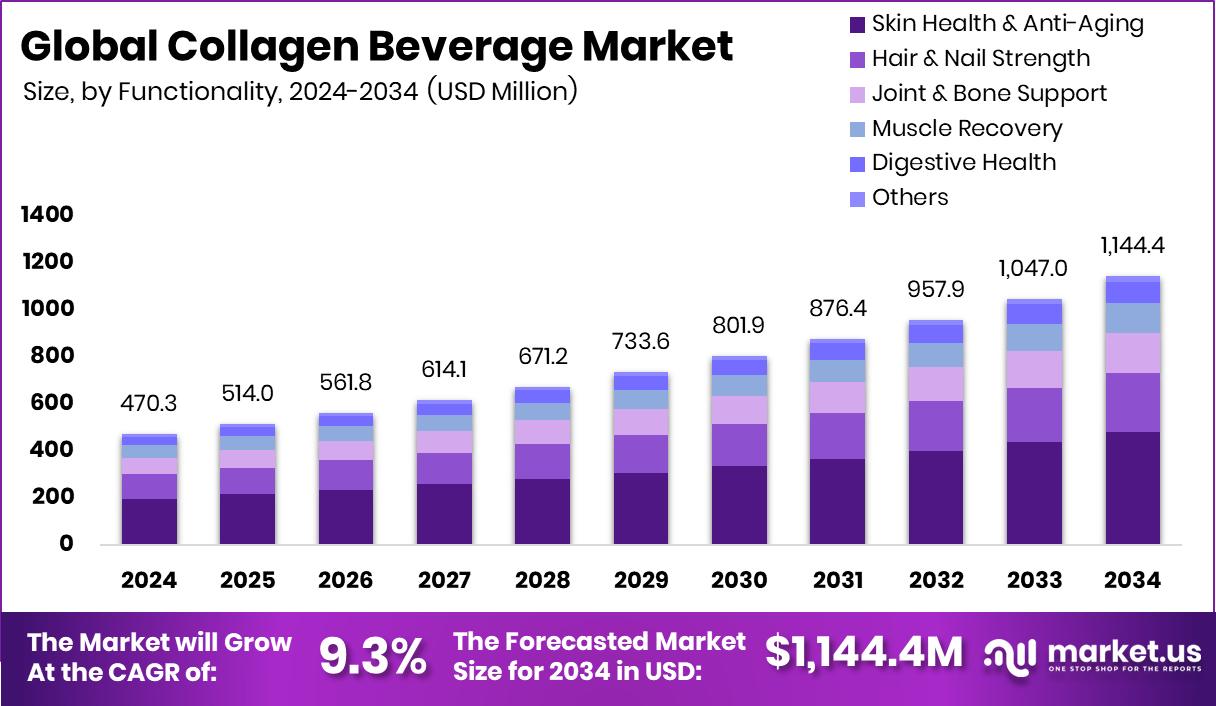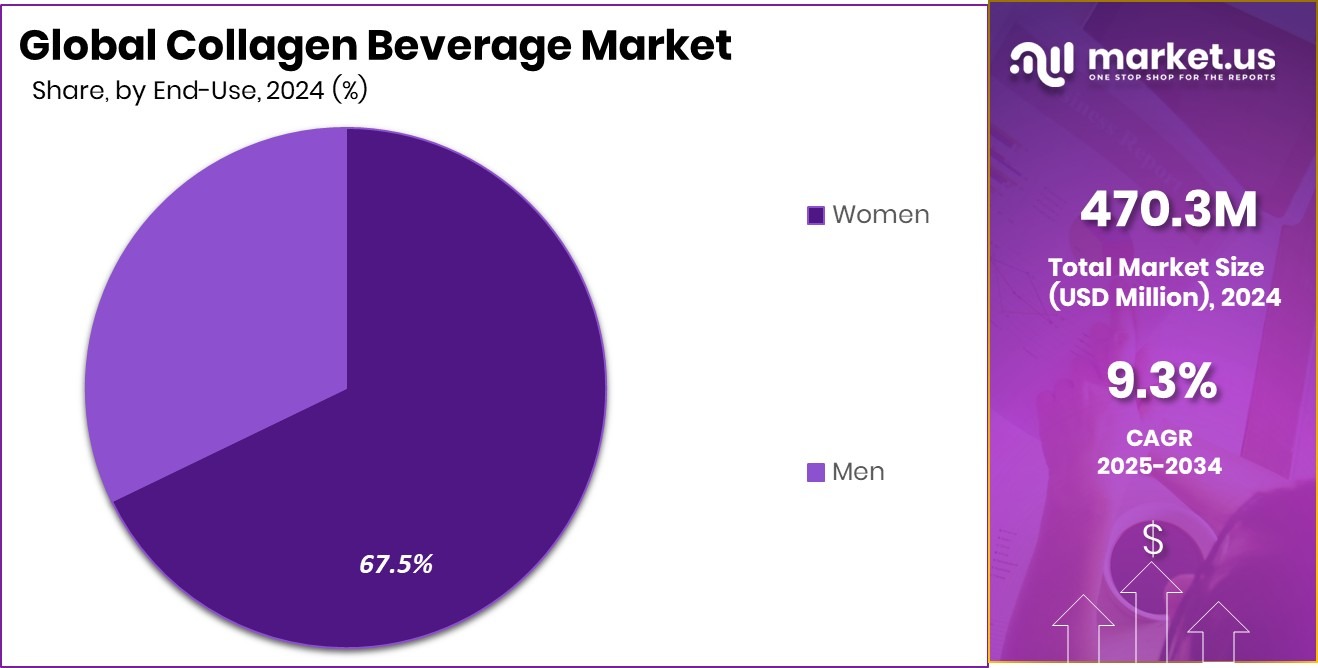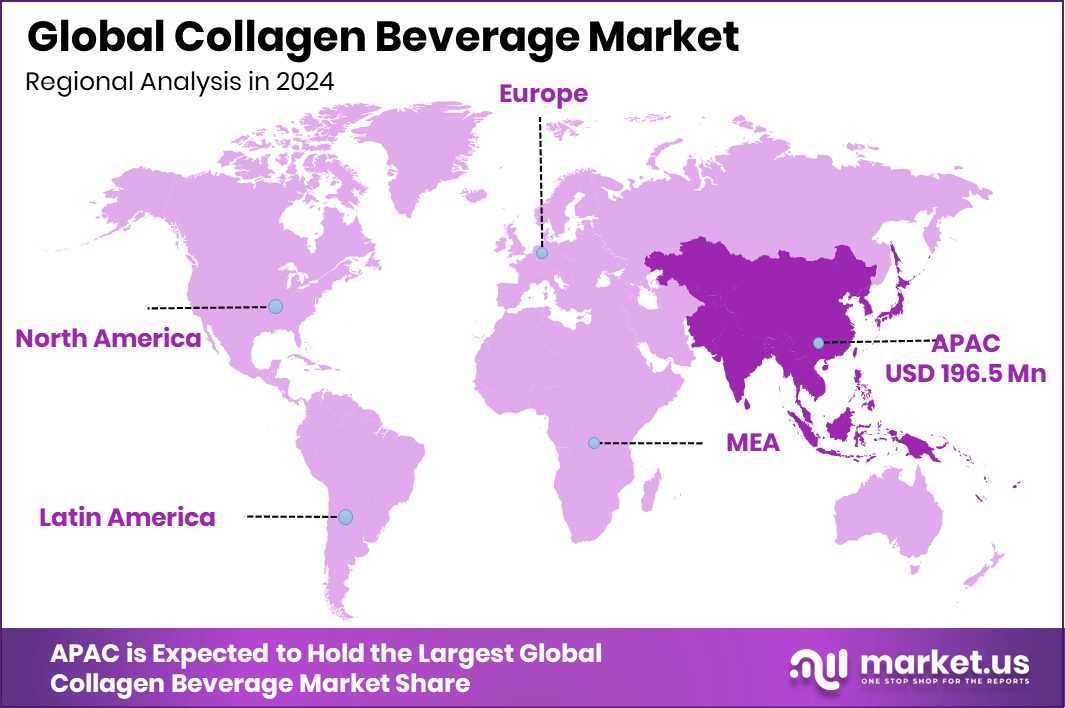Global Collagen Beverage Market Size, Share, And Business Benefits By Packaging (Glass, Plastic, Others), By Functionality (Skin Health and Anti-Aging, Hair and Nail Strength, Joint and Bone Support, Muscle Recovery, Digestive Health, Others), By End-Use (Women, Men), By Distribution Channel (Supermarkets and Hypermarkets, Pharmacies, Online, Others), By Region and Companies - Industry Segment Outlook, Market Assessment, Competition Scenario, Trends, and Forecast 2025-2034
- Published date: September 2025
- Report ID: 159559
- Number of Pages: 315
- Format:
-
keyboard_arrow_up
Quick Navigation
Report Overview
The Global Collagen Beverage Market is expected to be worth around USD 1,144.4 million by 2034, up from USD 470.3 million in 2024, and is projected to grow at a CAGR of 9.3% from 2025 to 2034. Asia Pacific’s 41.8% share, worth USD 196.5 Mn, shows consumer preference.
Collagen beverages are functional drinks infused with collagen peptides, designed to support skin elasticity, joint health, and overall wellness. Collagen, a structural protein naturally found in the body, diminishes with age, leading to visible skin aging and weaker connective tissues. These beverages provide an easy and enjoyable way for consumers to replenish collagen levels without the need for supplements in capsule or powder form. They often combine added vitamins, minerals, or natural flavors, making them appealing to both health-conscious and beauty-focused consumers.

The growth of the collagen beverage market is closely tied to rising health and beauty awareness. People are increasingly looking for products that not only quench thirst but also deliver functional benefits. The funding landscape also signals strong confidence in protein-based innovations—like the $3.5M oversubscribed seed round raised by a cell-based collagen brand to scale up animal-free protein. Such moves highlight how scientific innovation is pushing collagen beverages into mainstream wellness categories.
On the demand side, collagen beverages are benefiting from the shift toward preventive healthcare. Consumers are more proactive about investing in nutrition that supports long-term well-being. A Swiss startup securing $10M to repurpose a dairy factory for protein from beer waste further reflects the appetite for sustainable and alternative protein sources, which complement collagen-based innovations in the beverage space.
Looking at opportunities, the market is expanding into sustainability and next-gen food systems. Governments and investors are backing protein-focused projects, such as New Zealand’s $5.95M investment in cultivated seafood and Zhong Shanshan’s 3.4 billion yuan investment in the wellness sector. These examples highlight how nutrition, beauty, and sustainability are converging, creating fertile ground for collagen beverages to innovate with plant-based, cell-based, and eco-friendly formulations that align with consumer values.
Key Takeaways
- The Global Collagen Beverage Market is expected to be worth around USD 1,144.4 million by 2034, up from USD 470.3 million in 2024, and is projected to grow at a CAGR of 9.3% from 2025 to 2034.
- Glass packaging leads the collagen beverage market with 56.9%, reflecting consumer trust in premium and sustainable choices.
- Skin health and anti-aging dominate functionality with 41.8%, highlighting beauty-focused demand driving collagen beverage preferences.
- Women represent 67.5% of end-use, showing strong adoption of collagen drinks for wellness and beauty goals.
- Supermarkets and hypermarkets hold a 38.2% distribution share, indicating mainstream accessibility and growing consumer retail engagement worldwide.
- The Asia Pacific’s market value reached USD 196.5 Mn, highlighting strong growth.
By Packaging Analysis
For packaging, glass bottles dominate with 56.9%, reflecting premium positioning and trust.
In 2024, Glass held a dominant market position in the By Packaging segment of the Collagen Beverage Market, with a 56.9% share. The preference for glass packaging is strongly associated with its premium appeal and ability to preserve product integrity without altering taste or quality. Collagen beverages are often positioned as wellness and beauty-enhancing products, and glass bottles support this premium positioning by offering durability, recyclability, and an eco-friendly image that appeals to health-conscious consumers.
Additionally, glass is widely perceived as a safe and non-reactive material, ensuring the nutritional properties of collagen peptides remain intact. This consumer trust in quality and sustainability has allowed glass packaging to secure a leading share within the collagen beverage market.
By Functionality Analysis
By functionality, skin health and anti-aging lead demand, capturing 41.8% consumer preference.
In 2024, Skin Health and Anti-Aging held a dominant market position in the functionality segment of the Collagen Beverage Market, with a 41.8% share. This dominance is driven by increasing consumer focus on beauty-from-within products and the rising popularity of functional drinks that support youthful appearance.
Collagen beverages targeted at skin health appeal to individuals seeking convenient solutions for improving elasticity, hydration, and reducing visible signs of aging. The positioning of these drinks as part of daily wellness routines has strengthened their acceptance among a broad demographic, particularly women and aging populations. With growing awareness about the role of collagen in skin vitality, this segment has established itself as the leading functionality driver within the collagen beverage market.
By End-Use Analysis
By end-use, women represent 67.5%, driving beauty-focused collagen beverage consumption globally.
In 2024, Women held a dominant market position in the end-use segment of the Collagen Beverage Market, with a 67.5% share. The high share reflects the strong alignment of collagen beverages with women’s health and beauty needs, particularly in areas of skin health, anti-aging, and overall wellness. Women are more likely to adopt functional drinks that offer visible benefits for appearance and vitality, making this group the primary consumer base.
The positioning of collagen beverages as lifestyle-oriented and convenient supplements further supports their popularity among women who seek effective yet simple solutions. This significant demand has allowed the women’s segment to secure a leading role in shaping product innovation and growth trends in the collagen beverage market.

By Distribution Channel Analysis
By distribution channel, supermarkets and hypermarkets hold 38.2%, ensuring wider product accessibility.
In 2024, Supermarkets and Hypermarkets held a dominant market position in the By Distribution Channel segment of the collagen beverage market, with a 38.2% share. This leading share is driven by the strong presence of collagen beverages in large retail outlets where consumers prefer convenient access to a wide range of health and wellness products.
Supermarkets and hypermarkets offer greater visibility, promotional opportunities, and in-store displays that help in educating consumers about the benefits of collagen beverages. The availability of multiple brands and packaging options under one roof further enhances consumer trust and purchase decisions. As a result, this channel has become the primary driver of sales, solidifying its dominance within the collagen beverage distribution landscape.
Key Market Segments
By Packaging
- Glass
- Plastic
- Others
By Functionality
- Skin Health and Anti-Aging
- Hair and Nail Strength
- Joint and Bone Support
- Muscle Recovery
- Digestive Health
- Others
By End-Use
- Women
- Men
By Distribution Channel
- Supermarkets and Hypermarkets
- Pharmacies
- Online
- Others
Driving Factors
Rising Beauty-Health Awareness Boosts Functional Beverage Demand
One of the main driving factors for the collagen beverage market is the rising awareness of beauty and health benefits among consumers. Collagen drinks are now seen as more than just beverages—they are considered part of daily wellness routines that support youthful skin, joint flexibility, and overall vitality. This trend is supported by growing consumer interest in functional foods that deliver visible results.
The push for innovation is also fueled by new funding activities, such as Glass Imaging, raising $20 million to expand AI imaging technologies, which indirectly supports better research and marketing for health-focused products. Similarly, Standard Glass Lining securing Rs 40 crore in pre-IPO funding from Amansa Investments reflects investor confidence in wellness-linked industries, driving growth in collagen beverages.
Restraining Factors
High Product Cost Limits Wider Consumer Adoption
A major restraining factor for the collagen beverage market is the high cost of these products compared to regular functional or nutritional drinks. Collagen extraction, processing, and formulation involve advanced technologies, which increase production expenses and make the final beverages more expensive. For many consumers, especially in developing regions, these premium prices restrict regular purchases and reduce accessibility. While awareness of collagen’s health and beauty benefits
Growth Opportunity
Integration of Technology and Wellness Creates New Opportunity
A key growth opportunity for the collagen beverage market lies in merging wellness with innovative technology. As consumers seek personalized health solutions, the role of digital tools, augmented reality, and smart packaging can enhance how collagen beverages are marketed and consumed. For example, AR-enabled glasses can be used for interactive product education, helping buyers understand the benefits of collagen in real time.
Recent funding activities support this shift, such as CREAL securing $8.9 million to miniaturize light field display for AR glasses and Strolll raising €12.2 million for neuro-rehab AR software. These advancements show how tech-driven engagement can create stronger consumer trust, opening new pathways for growth in the collagen beverage market.
Latest Trends
Shift Toward Sustainable and Animal-Free Collagen Sources
One of the latest trends in the collagen beverage market is the move toward sustainable and animal-free collagen alternatives. Traditional collagen is mostly derived from animal sources, but growing environmental concerns and ethical preferences are pushing brands to explore plant-based and lab-grown collagen proteins.
Consumers, especially younger generations, are showing interest in products that align with eco-friendly and cruelty-free values. This has encouraged companies to invest in research and partnerships that develop innovative formulations without compromising quality or effectiveness. The trend also supports the broader global shift toward clean-label and transparent products, where buyers want to know how and where their wellness drinks are produced. This shift is creating a fresh identity for collagen beverages worldwide.
Regional Analysis
In 2024, the Asia Pacific dominated the Collagen Beverage Market with 41.8%.
The Collagen Beverage Market shows a diverse regional presence across North America, Europe, Asia Pacific, the Middle East & Africa, and Latin America. Among these, Asia Pacific emerged as the dominating region in 2024, holding a 41.8% share valued at USD 196.5 million, reflecting the region’s strong consumer base driven by rising health awareness and beauty-focused consumption.
North America continues to demonstrate steady demand, supported by a growing preference for functional drinks that combine nutrition and convenience. Europe maintains a robust presence, shaped by high consumer inclination toward wellness beverages and clean-label products.
Meanwhile, markets in the Middle East & Africa are gradually adopting collagen beverages, encouraged by expanding urban populations and increasing disposable incomes. Latin America is also showing progressive uptake, particularly among younger consumers looking for lifestyle-oriented health products. While Asia Pacific leads in share and value, other regions are contributing through evolving consumer behavior and gradual acceptance of collagen-based wellness trends.
Together, these regional dynamics highlight the market’s global growth potential, with Asia Pacific’s dominance underscoring its role as the primary growth engine for collagen beverages, while North America and Europe provide mature yet expanding opportunities for future development.

Key Regions and Countries
- North America
- US
- Canada
- Europe
- Germany
- France
- The UK
- Spain
- Italy
- Rest of Europe
- Asia Pacific
- China
- Japan
- South Korea
- India
- Australia
- Rest of APAC
- Latin America
- Brazil
- Mexico
- Rest of Latin America
- Middle East & Africa
- GCC
- South Africa
- Rest of MEA
Key Players Analysis
Shiseido Company Ltd. continues to strengthen its portfolio by leveraging its expertise in beauty and skincare to expand collagen-based drinks that align with its brand reputation for premium wellness solutions. Its role emphasizes the importance of combining cosmetic science with functional nutrition to capture consumer trust.
Vital Protein LLC has built its presence around lifestyle-oriented health products, making collagen beverages part of everyday routines for wellness-conscious consumers. Its branding focus on convenience and natural benefits has allowed it to resonate strongly with individuals seeking accessible functional drinks.
AmorePacific Corporation, known for its heritage in beauty and wellness, integrates collagen beverages into broader self-care trends. By connecting traditional wellness values with modern consumer preferences, the company has established itself as a trusted name in functional drinks catering to skin health and vitality.
Top Key Players in the Market
- Shiseido Company Ltd.
- Vital Protein LLC
- AmorePacific Corporation
- The Collagen Company
- TCI CO., LTD.
- Asertism Healthcare
- Hangzhou Nutrition Biotechnology Co. Ltd,
- Kinohimitsu
- Revive Collagen
- Heivy
Recent Developments
- In June 2025, Revive Collagen introduced Revive Collagen Vegan, their first clinically validated liquid vegan collagen formula, with 2,500 mg plant-based collagen and added vitamins.
- In September 2024, Vital Proteins introduced a new 20-oz paper-based canister for its unflavored collagen peptides, aiming to shift from plastic to paper packaging.
Report Scope
Report Features Description Market Value (2024) USD 470.3 Million Forecast Revenue (2034) USD 1,144.4 Million CAGR (2025-2034) 9.3% Base Year for Estimation 2024 Historic Period 2020-2023 Forecast Period 2025-2034 Report Coverage Revenue Forecast, Market Dynamics, Competitive Landscape, Recent Developments Segments Covered By Packaging (Glass, Plastic, Others), By Functionality (Skin Health and Anti-Aging, Hair and Nail Strength, Joint and Bone Support, Muscle Recovery, Digestive Health, Others), By End-Use (Women, Men), By Distribution Channel (Supermarkets and Hypermarkets, Pharmacies, Online, Others) Regional Analysis North America – US, Canada; Europe – Germany, France, The UK, Spain, Italy, Rest of Europe; Asia Pacific – China, Japan, South Korea, India, Australia, Singapore, Rest of APAC; Latin America – Brazil, Mexico, Rest of Latin America; Middle East & Africa – GCC, South Africa, Rest of MEA Competitive Landscape Shiseido Company Ltd., Vital Protein LLC, AmorePacific Corporation, The Collagen Company, TCI CO., LTD., Asertism Healthcare, Hangzhou Nutrition Biotechnology Co. Ltd,, Kinohimitsu, Revive Collagen, Heivy Customization Scope Customization for segments, region/country-level will be provided. Moreover, additional customization can be done based on the requirements. Purchase Options We have three licenses to opt for: Single User License, Multi-User License (Up to 5 Users), Corporate Use License (Unlimited User and Printable PDF)  Collagen Beverage MarketPublished date: September 2025add_shopping_cartBuy Now get_appDownload Sample
Collagen Beverage MarketPublished date: September 2025add_shopping_cartBuy Now get_appDownload Sample -
-
- Shiseido Company Ltd.
- Vital Protein LLC
- AmorePacific Corporation
- The Collagen Company
- TCI CO., LTD.
- Asertism Healthcare
- Hangzhou Nutrition Biotechnology Co. Ltd,
- Kinohimitsu
- Revive Collagen
- Heivy










